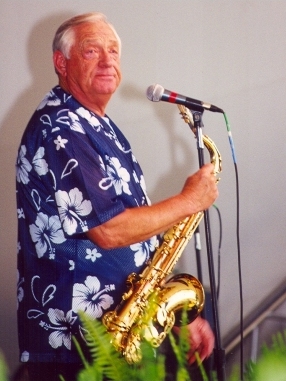
Search
Boots Randolph

Homer Louis "Boots" Randolph III (June 3, 1927 – July 3, 2007) was an American musician best known for his 1963 saxophone hit "Yakety Sax", which became the signature tune of The Benny Hill Show. Randolph was a prolific session musician and member of the Nashville A-Team, performing on numerous notable recordings by artists including Chet Atkins, Elvis Presley, Roy Orbison, Brenda Lee, and Al Hirt. During the span of his more than forty-year music career, Randolph performed in hundreds of venues alongside many artists in pop, rock, jazz, and country music.
Biography
Randolph was born in Paducah, Kentucky, on June 3, 1927. and raised in Cadiz, Kentucky. He said a brother gave him the nickname "Boots" to avoid confusion since his father and he had the same first name, though the reason for the nickname choice is unknown.
As a child, Randolph learned to play music with his family's band, who would enter talent shows to win food to help get by during the Great Depression. He started out playing the ukulele and trombone, but switched to tenor saxophone when his father unexpectedly brought one home.
Randolph graduated from Central High School in Evansville, Indiana and served in the United States Army toward the end of World War II, playing saxophone, trombone, and vibraphone in the U.S. Army Band until his discharge in 1946.
After his service in the Army, he played with Dink Welch's Kopy Kats in Decatur, Illinois, from 1948 to 1954. He briefly resided in Louisville, Kentucky, before returning to Decatur to start his own group. Early in his career, he often billed himself as Randy Randolph. In 1957 he left Decatur and relocated to the Nashville, Tennessee suburb of Hendersonville and was signed to RCA Victor by Chet Atkins in 1958. While Randolph's initial recordings for the label weren't commercial successes, they recognized his potential as a session musician, and Randolph became part of the Nashville A-Team. He played on Brenda Lee's 1958 hit "Rockin' Around the Christmas Tree", Al Hirt's 1963 instrumental hit "Java", and Roy Orbison's 1964 hit "Oh, Pretty Woman". He played on many recording sessions with Elvis Presley and also performed on soundtracks for a number of Presley's motion pictures, one popular song being "Return to Sender". He was also present on many recordings by guitarist Chet Atkins with whom he often performed.
In 1961 he signed with Monument Records, and as a solo recording artist placed four singles in the Top-100 between 1963 and 1967. The most successful of these was "Yakety Sax", which reached #35 in 1963 and stayed on the charts for nine weeks. Randolph was also successful on Billboard Magazine's album charts, having fourteen entries between 1963 and 1972. Boots With Strings from 1966 reached #36 and stayed on the chart for nearly two years.
Randolph often maintained a schedule of over 200 recording and performance commitments annually. He also appeared on numerous television shows including The Ed Sullivan Show, The Tonight Show Starring Johnny Carson, The Jimmy Dean Show. In the 1980s, he also frequently appeared on the television program Hee Haw as a member of the Million Dollar Band.
In 1977, Randolph opened and performed regularly at Boots Randolph's, a 275-seat nightclub in downtown Nashville's Printer's Alley, which remained in operation until 1994.
Personal life and death
Randolph married Dee Baker in 1948; they had a son, Randy, and a daughter, Linda. On July 3, 2007, Randolph died at Skyline Medical Center in Nashville, after suffering a brain hemorrhage. He had celebrated his 80th birthday just one month prior.
His final solo studio album, A Whole New Ballgame, was released June 12, 2007.
Discography
Albums
- A "Boots with Strings" also peaked at #3 on Jazz albums and #21 on R&B albums.
- B "Country Boots" peaked at #30 on Country albums
Singles
See also
- The Nashville A-Team
References
External links
- Official Site
- Boots Randolph at IMDb
- Boots bio
- Some of his music
- Boots Randolph Interview at NAMM Oral History Collection (2003)
Text submitted to CC-BY-SA license. Source: Boots Randolph by Wikipedia (Historical)
Articles connexes
- Yakety Sax
- Yakety Yak
- I Can't Stop Loving You
- O (Oh!)
- The Nashville A-Team
- The Benny Hill Show
- Boots (nickname)
- Puss in Boots: The Last Wish
- I Fall to Pieces
- Gentle on My Mind
- The Shadow of Your Smile
- Printer's Alley
- Monument Records
- Million Dollar Band (country music group)
- Flushed Away
- Chet, Floyd & Boots
- Jimmy Sturr
- List of 1960s musical artists
- Floyd Cramer
- R.E.O./T.W.O.
Owlapps.net - since 2012 - Les chouettes applications du hibou

